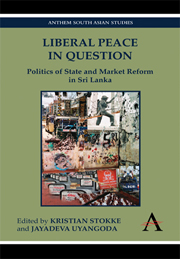Book contents
- Frontmatter
- Contents
- List of Illustrations
- List of Contributors
- 1 Liberal Peace in Question: The Sri Lankan Case
- 2 Travails of State Reform in the Context of Protracted Civil War in Sri Lanka
- 3 Fallacies of the Peace Ownership Approach: Exploring Norwegian Mediation in Sri Lanka
- 4 The Politics of Market Reform at a Time of Ethnic Conflict: Sri Lanka in the Jayewardene Years
- 5 From SIHRN to Post-War North and East: The Limits of the ‘Peace through Development’ Paradigm in Sri Lanka
- 6 Buying Peace? Politics of Reconstruction and the Peace Dividend Argument
- 7 Women's Initiative in Building Peace: The Case of Northern Sri Lanka
- 8 Liberal Peace and Public Opinion
- Notes
- References
8 - Liberal Peace and Public Opinion
Published online by Cambridge University Press: 05 March 2012
- Frontmatter
- Contents
- List of Illustrations
- List of Contributors
- 1 Liberal Peace in Question: The Sri Lankan Case
- 2 Travails of State Reform in the Context of Protracted Civil War in Sri Lanka
- 3 Fallacies of the Peace Ownership Approach: Exploring Norwegian Mediation in Sri Lanka
- 4 The Politics of Market Reform at a Time of Ethnic Conflict: Sri Lanka in the Jayewardene Years
- 5 From SIHRN to Post-War North and East: The Limits of the ‘Peace through Development’ Paradigm in Sri Lanka
- 6 Buying Peace? Politics of Reconstruction and the Peace Dividend Argument
- 7 Women's Initiative in Building Peace: The Case of Northern Sri Lanka
- 8 Liberal Peace and Public Opinion
- Notes
- References
Summary
The Peace Process and the Excluded Public
Sri Lanka's 5th peace process was characterised by being narrowly confined to formal negotiations between the principal protagonists to the conflict. The negotiations between the United National Front(UNF) government and the Liberation Tigers of Tamil Eelam (LTTE) excluded a broad range of elite and popular actors in political and civil society (Liyanage 2008, Rupesinghe 2006b, Uyangoda and Perera 2003). Sinhalese political parties such as Sri Lanka Freedom Party (SLFP), Janatha Vimukthi Peramuna (JVP) and Jathika Hela Urumaya (JHU), Tamil parties such as Tamil National Alliance (TNA) and Eelam People's Democratic Party (EPDP) and Muslim political parties such as Sri Lanka Muslim Congress (SLMC) were excluded from the formal negotiations. In civil society there was no independent representation of trade unions, religious communities, popular movements, non-governmental organisations or mass media in the formal negotiations and no parallel process of dialogue and reconciliation. This design was a pragmatic adaptation to the military-territorial balance of power between two warring parties that was further institutionalised through the GOSL–LTTE negotiations over cessation of hostilities, implementation of the Ceasefire Agreement, humanitarian relief and rehabilitation and political conflict resolution. Although the conflict resolution process revolved around contested issues of state and market reforms, there were no institutionalised channels for inclusion of other political actors, civil society associations or the public in general.
Despite this exclusion of stakeholders within the political elite and in civil society, the peace process was nevertheless based on the assumption that it would deliver popular support and disarm political spoilers.
- Type
- Chapter
- Information
- Liberal Peace in QuestionPolitics of State and Market Reform in Sri Lanka, pp. 157 - 182Publisher: Anthem PressPrint publication year: 2011



